May 8, 2024 | 14:41 GMT +7
May 8, 2024 | 14:41 GMT +7
Hotline: 0913.378.918
May 8, 2024 | 14:41 GMT +7
Hotline: 0913.378.918
After two series, “The vast Central Highlands and the pain of earth” and “Replenishment of Central Highlands soil”, Vietnam Agriculture News and readers have experienced special emotions from sharing and understanding to scientific criticism and profound professional contributions.
Such a majestic land, full of potential but facing many challenges, is the consequence of the irresponsible way how our own farmers execute agroproduction. But also from this situation, new sustainable farming methods emerge, ready to further nurture the root of the development of this region.
Temporarily closing the series, VAN still hopes to hear the enthusiastic voices of readers, managers, experts and farmers themselves and return with new articles in the near future.

Vo Ngoc Son (left) showing confidence in his journey to return color to the soil. Photo: Hoang Anh.
Among countless pesticide shops in key areas growing pepper, coffee, and durian across the National Highway 14C connecting Dak Lak to Dak Nong, the sign "Farmers say no to chemicals" of a store in Dak Mil looks special.
The owner is “Son Keviln”, real name Vo Ngoc Son (34 years old), a guy from Nghe An who has been accompanying farmers for many years with the mission of rescuing fruit orchards throughout the Central Highlands.
Son Keviln is the name on his Facebook where he regularly livestreams to change farmers’ perceptions and accompany them in the journey "Return color to the soil" he himself initiated. It is surprising to know that Son alone is directly accompanying more than 4,000 farmer households as well as tens of thousands of other farmers through social networks like Zalo and Facebook.
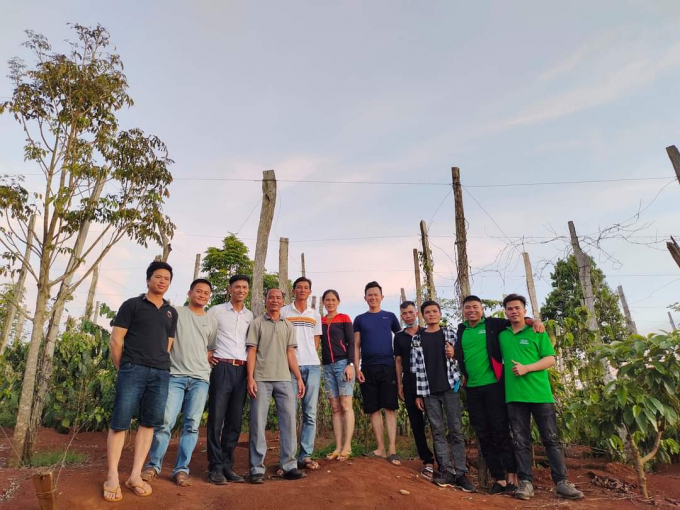
For ten years Vo Ngoc Son has been wandering around the Central Highlands to accompany farmers on the journey to change their perception of farming. Photo: NS.
More than ten years ago, Vo Ngoc Son started thinking about agriculture after an incident of his own. That was when he almost died from vegetable poisoning - the green vegetable that the people of Dak Mil often take care of with countless pesticides and herbicides.
And not only vegetables but other crops were also soaked in pesticides and fertilizers due to indiscriminate application. The more weeds and pests appeared, the more they sprayed. The more infertile the soil became, the more they fertilized. They used money to pay for what fell down to the ground, but sometimes the payment was health and even human life. That reality frightened the young man.
In 2009, Son Keviln’s first challenge was to convince his parents to cut 1.7 ha out of the 7 ha of his family’s coffee growing area to switch to the organic coffee growing procedure. "Return color to the soil" became Vo Ngoc Son's farming philosophy, and his journey began right on the family's coffee field.
It took Son two years to revive the soil, leaving the soil at rest, just throwing down lime and letting it gradually detoxify, stopping all chemical inputs. When weeds started to grow, he added probiotics to revitalize the soil. After the dead land is revived, the next solution he thought of was to reduce input costs. Son researched, tested and calculated, even went to the Western Highlands Agriculture and Forestry Science Institute to seek technical advice.
At last, a set of organic fertilizer solutions for coffee was born. The fertilizer was composted from soybeans, fish, fruits and other agricultural wastes, the bio-pesticide was made from ginger, lemongrass, garlic, chili and many other essential oils from orange and grapefruit peel. They served as great nourishment for the soil, causing no harm to farmers while helping Son cut short 50% of production costs compared to normal cultivation.
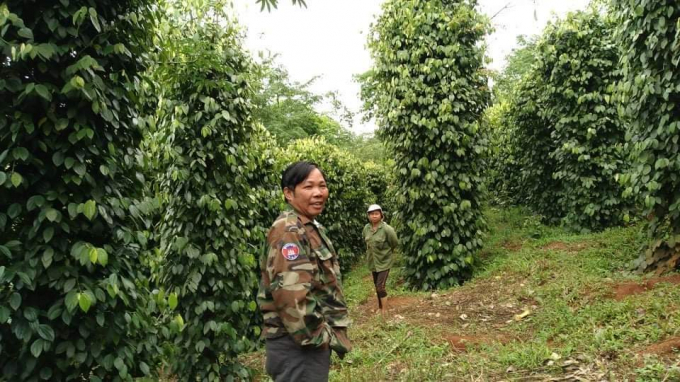
Farmers must decide for themselves the fate of their own land. Photo: Minh Quy.
Another seven years and a couple hundred million dong, and the coffee replanting model using organic farming solutions was finally completed. The result was obvious. While farmers were still conducting conventional farming and selling coffee for VND 40,000 - 50,000/kg, Son's organic coffee products received many orders with a price of VND 200,000/kg. Son was then invited to participate in conferences, workshops and reality programs to spread his knowledge and help other farmers change their cultivation practices.
After the success with the production procedure and organic coffee brand, Vo Ngoc Son wandered all five provinces of the Central Highlands to join with farmers to "save the land first, save the trees later".
Thousands of ha of pepper, coffee, durian and other fruit trees have been revived thanks to such wanderings. More and more farmers have changed their mindset and come looking for Son Keviln’s help. Even organic pepper, coffee, and durian cooperatives line up in wait for Son's support. It is no exaggeration to say Vo Ngoc Son’s influence alone is what has created a community of "farmers say no to chemicals" - A community, as Son said, "walks together to the end".

The gardens are gradually reborn with each footstep Sonkeviln and farmers take. Photo: Hoang Anh.
“Many people think that organic farming is difficult and requires a long time while the productivity remains low, but it is not true. If the investment costs, prices and product values are clearly accounted for, organic farming is bound to bring greater profits, not to mention many other benefits in terms of the environment, human health, and community value. Every time I accompany a farmer, I take them to my organic coffee garden, and I often tell them, “Can you see? My garden has not had any chemicals for 5-6 years but is still green and productive. So you guys don’t have to hesitate anymore. Just boldly make the change," said Son Keviln.
Vo Ngoc Son intends to establish a cooperative. His wish is that good agriculture should be performed in a whole community so that the influence will spread far and wide.
Translated by Samuel Pham
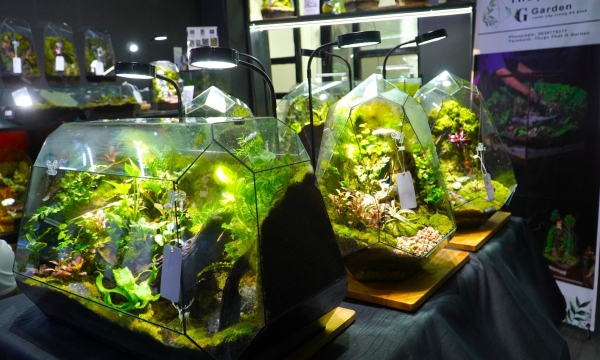
(VAN) Terrarium art has been more popularity in Vietnam, with meticulousness and delicacy, artisans create a minimal ecology to the living space of human.
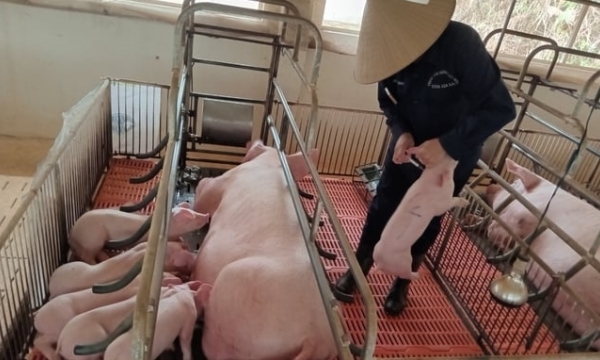
(VAN) Many barriers in legal procedures, as well as difficulties in land funds, discourage many large-scale pig farming investors in the Central Highlands.
/2024/05/06/2512-1-102207_688.jpg)
(VAN) Chairman of Hung Nhon Group Vu Manh Hung shared the investment orientation in high-tech agriculture at the announcement ceremony of the Decision approving the planning of Tay Ninh province on May 5.
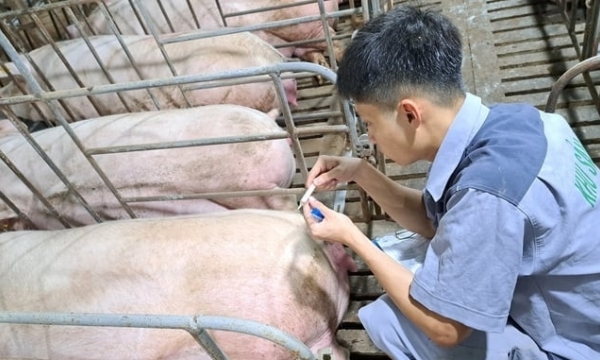
(VAN) Kon Tum province focuses on attracting high-tech livestock projects with closed-loop processes from production, breeding, to processing, and distributing.
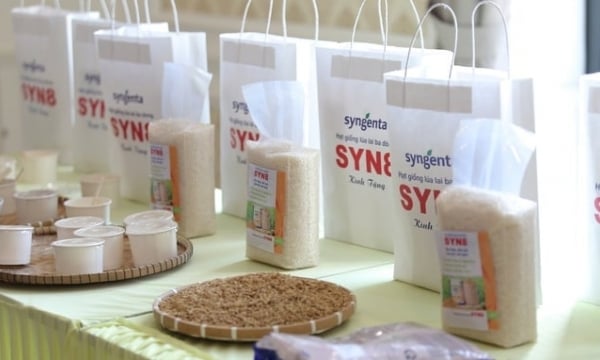
(VAN) The new Syn8 three-line hybrid rice variety, first introduced to Vietnam by Syngenta in 2020, has exhibited significant advantages after extensive testing and evaluation.
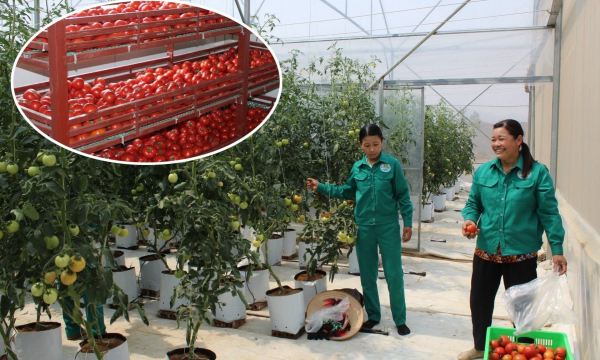
(VAN) The greenhouse complex stretches along the undulating hills, once abandoned, now serving as a source of fresh vegetables for over 16,000 students in the district.
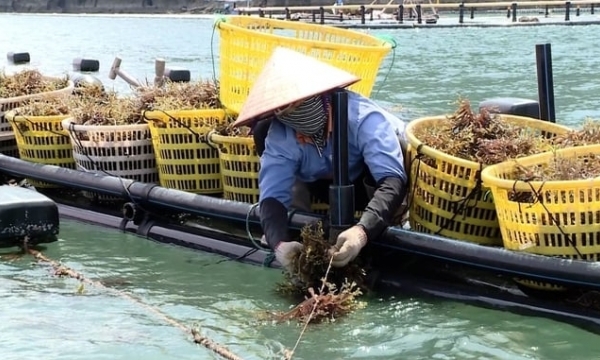
(VAN) Seaweed and marine algae have advantages in environmental protection and sustainable economic development, meeting food needs with uses in other fields